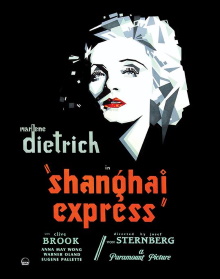There ordinarily wouldn’t be much reason to watch this very old pre-Hays Code American film except it is set in China at the height of the Chinese Civil War. We have plenty of Chinese films and television shows set during this tumultuous period but this is an American film made while those events were still ongoing in China. This I had to see. The film was entirely shot in the US but the sets look convincing enough that it had us wondering. The Chinese extras in it all speak Cantonese which we all know to be wrong for the location but I’m still impressed that they managed to get enough Chinese and realistic enough props to pull off this fake China.
The civil war in China in 1931 apparently isn’t enough reason to stop the train travelling from Peking to Shanghai. Among the passengers on board this trip are British Army Captain Donald Harvey who is also a doctor, and Shanghai Lilly, a European lady who is an infamous courtesan. The two meet by chance on the train and we learn that they were involved in a relationship years ago. During a stop, soldiers from the Chinese government stop to question everyone and after arresting a Chinese passenger allows the train to continue on. It turns out that he was a high-ranking officer in a rebel army and the leader of that group is also on the train, a mixed European-Chinese man named Chang who is travelling incognito. He arranges for his army to assault and stop the train, holding the passengers for ransom to negotiate the release of his officer. As he interrogates all those to determine who is important enough, he settles on Harvey who turns out to be going to Shanghai to operate on the Governor-General. Throughout all this, Harvey and Lilly pretend that their relationship is behind them but it is evident that they are still deeply in love with one another.
The film wants the romance between Harvey and Lilly to be its heart and yet that is the least interesting thing in it. It’s all silly drama about each of them refusing to be first to admit that they still love the other and them dancing around the shame of Lilly having become a prostitute. They even add a Christian missionary into the mix who is initially all fiery condemnation against Lilly and another Chinese courtesan Hui Fei who shares her train compartment, but later realize that she isn’t so bad after all. It’s predictable, morally outdated and boring. Hui Fei is particularly ill-served here. She is really the only Chinese character in the film, played by Anna May Wong, one of the very first Chinese American movie stars. She is the one who suffers the most under Chang and later takes action to save them all. But the film still considers her to be a side character and insists on putting Lilly and Harvey in the spotlight.
What this film does do well is capture a sense of what China was like in that era from a contemporary Westerner’s perspective. It’s condescending of course but it’s so fascinating to see the bustle and chaos as shown here as well how cosmopolitan a major city was with all kinds of people passing through it. The visual details seem impressively right to us too though as I noted the spoken Chinese is all wrong. It seems that it feels right at least partially because it was inspired by a real such event that took place in 1923. Unfortunately the action choreography is really bad and every time there is fighting on screen, everyone looks like they are just flailing around. The film is also too reluctant to show serious violence or brutality even though plenty of both is implied to have taken place or shown indirectly. One funny way that this shows up is how Harvey keeps maintaining British reserve and cool-headedness even when the situation is absolutely desperate. He looks almost apologetic when he needs to fight and doesn’t seem to have any sense of urgency at all.
I wouldn’t call this a good film as it’s more of a historical curiosity than anything else. It’s amazing to think of how widely Hollywood looked for source material even back in the 1930s and how they were able to whip up these scenes of a fake China right in the US itself.
